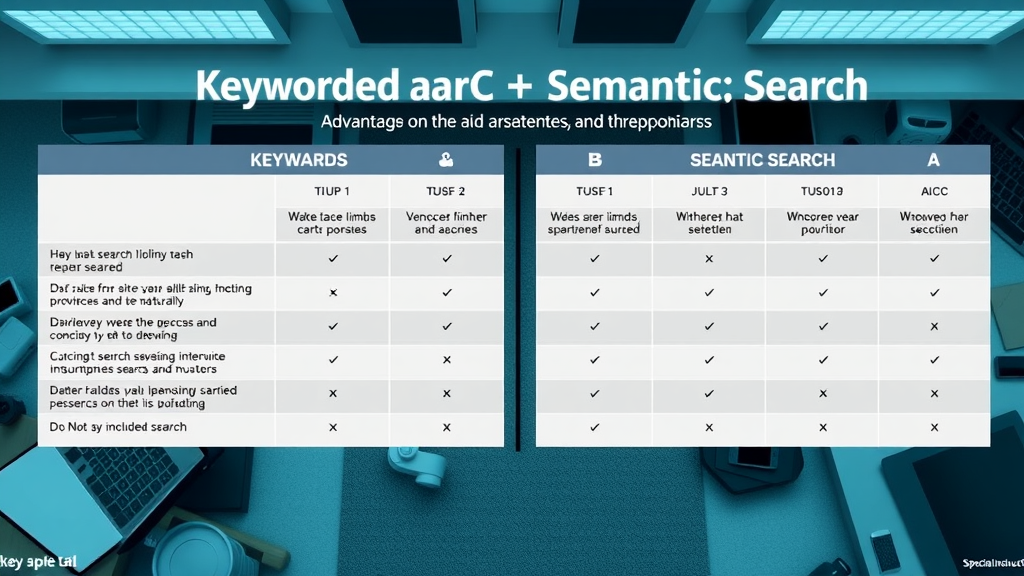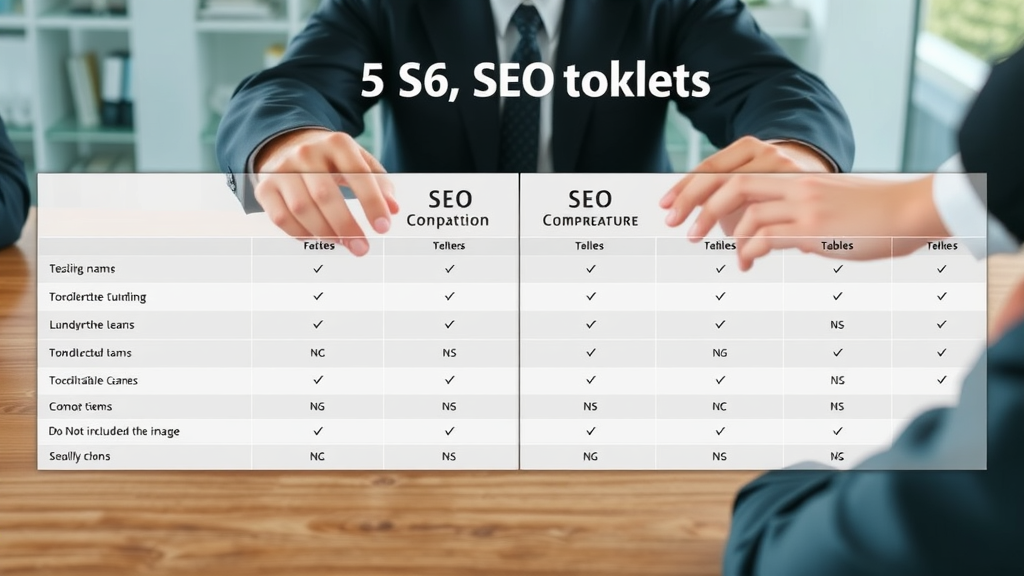How do you navigate the vast digital landscape to find the most relevant information? The answer lies in understanding the nuances of keyword search vs semantic . As search engines evolve, so do the methods to retrieve information efficiently. Dive into this comprehensive analysis to determine what search approach fits your needs best.
Engaging in the Debate: Keyword Search vs Semantic Search
The ongoing discussion about keyword search vs semantic search reflects a deep-seated inquiry into search methodologies. With keyword search , users input precise terms or phrases to retrieve results directly matching those words. In contrast, semantic search offers a more advanced technique, considering the context and user intent to generate results. Understanding the fundamental differences and applications of these methods enables users to tailor search strategies to their specific needs.
Defining Keyword Search and Semantic Search

Keyword search entails entering specific terms into a search engine to retrieve exact matches. It is a direct approach based primarily on the frequency and location of keywords within web content. Conversely, semantic search delves into the meaning behind words. By using natural language processing , semantic search comprehends the relationships between words, enhancing the ability to provide relevant results even when exact matches are missing. This nuanced understanding delivers results aligned with user intent, making it a powerful asset in a dynamic information environment.
Practical Examples of Search Queries in Both Methods
Consider a basic search for "apple nutritional benefits." In a keyword-based system, search results will primarily include pages containing those exact words. However, a semantic search engine might deliver content aligning with the user's presumed goal, such as detailed nutritional profiles or related articles on apple's health effects. This demonstrates how semantic searches can yield results relevant to broader user interests.
Understanding Search Intent Through Different Search Types

Search intent plays a pivotal role in determining the efficiency of a search system. Keyword methodologies excel when exact matches to search terms are crucial. Conversely, semantic approaches thrive when understanding the broader context and user intent is necessary. For example, when searching "best Italian restaurants," semantic engines consider past behavior or location to refine results. Understanding these mechanisms aids in selecting the most fitting approach to align with your search objectives.
Unpacking Semantic Search: An In-Depth Analysis
Exploring deeper into the realm of semantic search , this method leverages advanced technologies to deliver more intuitive results. By examining user behavior and context, semantic systems aim to present relevant results that need not rely solely on keyword match frequency.
Natural Language Processing: The Backbone of Semantic Search

Natural language processing (NLP) serves as the cornerstone of semantic search methodologies. By enabling computers to understand, interpret, and manipulate human language, NLP allows for a more in-depth analysis of language structure and meaning. It empowers search engines to move past mere keyword detection, closer to understanding the intent and subtle nuances of spoken or written requests. This technological advancement translates to more meaningful and personalized search engagements with users across various queries.
Vector Search: A New Dimension in Search Systems
Vector search introduces a transformative element to search systems , representing data as vectors to fetch semantically similar results. This method leverages mathematical models to interpret features corresponding to user queries, providing a more adaptive form of content retrieval. Enhanced by advanced machine learning algorithms, vector search addresses semantic gaps often present in traditional keyword methods.
Advantages of Semantic Search in Modern Contexts
The advantages of semantic methodologies in today's digital landscape are profound. They cater to the complexities of human language, allowing search engines to provide relevant results by understanding contexts and queries. Semantic search enhances user experiences by creating connections between queries and relevant documents, making information retrieval more intuitive and aligned with current technological expectations. These attributes underline its pivotal role in achieving relevant searches , especially in specialized fields such as academic research and content curation.
Quotes from Industry Experts on Semantic Search
Industry leaders across digital platforms emphasize the transformative potential of semantic search. John Miller, a leading AI strategist, states, "Semantic search represents the future of information retrieval. It bridges the gap between machine efficiency and human cognition, enabling a more organic form of digital communication." By embedding the voices of experts, the broader community appreciates the evolving capabilities of semantic-based technologies.
Keyword Search and Its Continued Relevance

The enduring relevance of keyword search lies in its simplicity and reliability. Despite the rise of semantic alternatives, keyword search remains a foundational element in various fields requiring precise data retrieval.
Examining Lexical Search in Keyword Search Frameworks
Lexical search techniques continue to be quintessential within keyword search frameworks. As the search landscape evolves, lexical methodologies are refined to accommodate new search terms and user behaviors. This traditional keyword approach remains particularly effective where exact language precision is essential, such as searching for specific code libraries or academic references.
Search Terms and Their Evolving Role in Keyword Search
The role of search terms within keyword-based search remains at the forefront of search strategies. As language evolves, so too do the expressions used in search queries. Staying attuned to these shifts enables search engines to accommodate emerging phrases and terminology, ensuring search result relevance.
Evidence of Keyword Search Efficacy Today
Despite technological advancements, studies indicate that keyword search maintains efficacy in delivering exact match results, especially in domains dominated by fixed lexicons. For instance, ecommerce platforms often rely on keyword search to pair users with precise products, reflecting its enduring value in driven digital conversions.
List of Common Misconceptions in Keyword Search
- Keyword search is outdated: Despite developments in search technologies, keyword search remains crucial for specific result precision.
- Semantic search always provides better results: While often valuable, semantic search doesn't always outperform keyword search, particularly when precise matches are required.
- Focusing only on search terms is sufficient: Understanding search intent is equally crucial for optimizing user experience.
Comparing Search Systems: Semantic vs Keyword Search
The comparative dynamics between semantic and keyword searches deserve comprehensive consideration. Each method possesses intrinsic virtues, making it imperative to dissect the underlying mechanisms and practical outcomes to cater to various digital environments.
Analyzing Search Terms and Language Processing
Search terms form the foundation of both keyword and semantic methodologies. Yet, the processing and interpretation of these words can differ starkly. While keyword approaches focus strictly on term frequency and placement, semantic systems utilize natural language processing to connect disparate terms via context. This advancement broadens the search's applicability, catering to contemporary demands for enriched user interactions.
Case Study: Effective Search Methods in Action
Consider an online bookstore implementing both search methods. While a keyword search may excel in retrieving specific titles, a semantic search can recommend related reads based on user interest in genres or themes. This dual approach underscores the value of integrating both systems to enhance the overall search experience .
Table: Pros and Cons of Keyword and Semantic Searches

| Feature | Keyword Search | Semantic Search |
|---|---|---|
| Precision | High for exact queries | Moderate, dependent on AI understanding |
| Context Understanding | Low, no context consideration | High, finds relevant documents based on context |
| Versatility | Limited to specific queries | Adaptable to varied user intent |
People Also Ask: Clarifying Key Differences
What is the difference between keyword search and semantic search?
Keyword search hinges on retrieving results through exact term matches, whereas semantic search interprets the meaning behind queries to provide contextually suitable outcomes, thus enhancing the search experience by aligning closer with user needs.
What is the difference between semantic search and text search?
While text search fixates on matching exact textual elements, semantic search interprets the intent and context behind these elements, offering a deeper understanding and fostering nuanced search results.
What is the difference between semantic search and exact search?
While exact search precisely matches user input with available text or data sets, semantic search broadens its scope, incorporating related conceptual or intent-based connections to deliver more diverse and relevant results .
What is the difference between keyword search and lexical search?
While both approaches focus on word-based retrieval, keyword search generally targets broader phrases, whereas lexical search depends heavily on word location and frequency within text to find specific documents.
Conclusion: Which Search Method Suits You Best?
Summary of Key Takeaways

Choosing between keyword and semantic search hinges on your specific needs. If you seek precision, keyword approaches are beneficial. However, for contextually nuanced results, semantic search is invaluable.
Final Thoughts on Choosing Between Semantic and Keyword Searches
Both semantic and keyword searches boast unique benefits. Deciding which to employ can greatly depend on the context of your search task. Understanding the strengths each offers will help in forming a comprehensive and adaptive search strategy.
 Add Row
Add Row  Add
Add 




Write A Comment